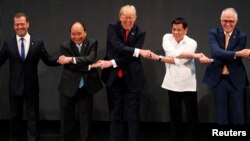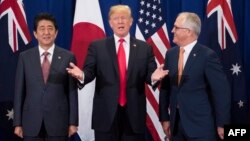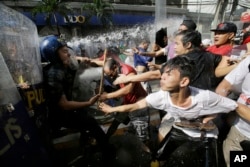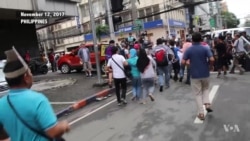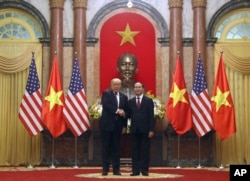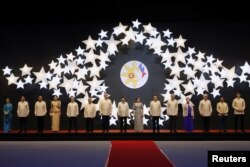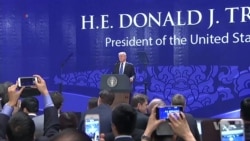President Donald Trump says he will have “a major statement” on trade when he returns to Washington following a 12-day, five-nation trip to Asia.
Speaking on the sidelines of the ASEAN Summit in the Philippines Monday, Trump said “We’ve made a lot of big progress on trade.” He added that his Asia trip has generated $300 billion “in sales to various companies, including China.” However, he offered no details on the coming trade announcement.
His comments came at a trilateral meeting on the sidelines of ASEAN with the leaders of Japan and Australia. He said the three were discussing trade, North Korea and other subjects.
Earlier, as regional leaders gathered at a colorful ceremony to open this year’s ASEAN summit in Manila, Philippine President Rodrigo Duterte sidestepped the sensitive issue of combating illegal drugs, which he himself had raised.
In opening remarks at the plenary session of the 31st summit of the Association of Southeast Asian leaders Monday, he called illegal drugs a menace that threaten “the very fabric of our society,” without mentioning methods to control the crime.
“I apologize for setting the tone of my statement in such a manner, but I only want to emphasize that our meetings for the next two days present an excellent opportunity for us to engage in meaningful discussions on matters of regional and international importance,” Duterte told 17 other heads of state after also mentioning a recent fight against Muslim rebels in the southern Philippines as well as the broader threat of terrorism.
Duterte’s war on drugs
Asian experts say they do not expect President Donald Trump to raise human rights issues and concerns about extrajudicial killings when he meets with Duterte.
“I’m sure he will not take it up,” Duterte said Sunday. Human rights groups have expressed alarm over allegations that Philippines police have killed 3,000 to 7,000 suspected drug users and dealers in a countrywide crackdown, one of the president’s major campaign promises.
Trump told Duterte earlier this year that he is doing “a great job” and has yet to openly criticize the Philippines leader for his alleged campaign of violence.
Duterte had once insulted former President Barack Obama, calling him a “son of a whore.” He also boasted of murdering someone when he was 16 because the victim gave him a funny look.
Except for comments on North Korea, the issue of human rights has scarcely emerged during Trump’s Asian tour.
Protests greet Trump
Trump arrived in Manila Sunday. About 3,500 protesters tried to march on the U.S. Embassy and were stopped by riot police. The protesters shouted for Trump to leave and accused the U.S., a former Philippine colonizer of about 50 years, of looking for overseas wars.
One banner read “Dump Trump — #1 Terrorist!”
Another group of protesters was marching toward the leadership summit venue near Manila Bay as of 10 a.m. Monday, an organizer said.
Momentum in Vietnam
Before arriving in Manila, Trump met in Hanoi with Vietnamese President Tran Dai Quang. Trump told a joint press conference, “For trade to work, all countries must play by the rules. I am encouraged that Vietnam has recently become the fastest growing export market to the United States.”
He added “I am confident that American energy, agriculture, financial services, aviation, digital commerce, and defense products are able to meet all of your many commercial needs.”
Speaking to Communist Party General Secretary Nguyen Phu Trong in Hanoi, Trump said “Think where we are and where we have come, it’s a tribute to both countries. Trade has become a very important element of our relationship.”
Quang called his meeting with Trump as “A milestone in Vietnam-U.S. relations, creating strong momentum for the substantive, effective, and stable development of the bilateral, comprehensive partnership.”
North Korea
Trump and Quang also discussed disputes over the South China Sea and tense relations with North Korea. Trump called North Korea a major threat to peace and stability in the region. “As I said in my speech to the Republic of Korea’s national assembly, all responsible nations must act now to ensure that North Korea’s rogue regime stops threatening the world with unthinkable loss of life.”
He added, “We want stability not chaos and we want peace, not war.”
In a Tweet Sunday, Trump hit back at North Korean leader Kim Jong Un, who had again called him a dotard, a term that describes an elderly person who is losing his mental abilities.
During his bilateral meeting with Quang, Trump also offered his services as a mediator for the South China Sea dispute. When asked about the offer at the press conference, Quang would only say Vietnam seeks a peaceful resolution to the issue through negotiations and in line with international law.
APEC
Before his arrival in Hanoi, Trump was in the central Vietnamese city of Danang, where he attended the Asia-Pacific Economic Cooperation summit.
Trump said he spoke to APEC leaders about previous agreements that created trade imbalances he says hurt the United States.
“It’s disgraceful,” he said. “And I don’t blame any of those countries. I blame the people we had representing us who didn’t know what they were doing because they should have never let that happen.”
At the close of the APEC meeting, the 21 member nations expressed support for free trade and closer regional ties, without any mention of Trump’s “America First” doctrine.
The talks in Manila will likely cover North Korea, the South China Sea and terrorism from a Southeast Asian angle. Many hope Trump will offer stronger trade and security ties to Southeast Asia but doubt he will announce deliverables this week.
China
On Friday, Trump and his Chinese counterpart, President Xi Jinping, offered starkly contrasting views of the direction for trade in Asia in separate speeches to regional business leaders.
Trump told the APEC CEO Summit that he is willing to make bilateral trade agreements with any country in the Indo-Pacific region, but he firmly rejected multi-national deals such as the 12-nation Trans-Pacific Partnership, which he abandoned early in his administration.
The president said he will make deals with nations that want “to be our partner and that will abide by the principles of fair and reciprocal trade.” Trump said we will no longer sign deals that “Tie our hands, surrender our sovereignty, and make meaningful enforcement practically impossible.”
WATCH: Leaders of US and China Offer Asia Business Leaders Divergent Paths
The U.S. president said that in the past when his country “lowered market barriers, other countries didn’t open their markets to us. ... We expect that markets will be open to an equal degree on both sides and that private investment, not government planners, will direct investment.”
President Xi, whose country’s rise has been driven by large-scale government planning, immediately followed Trump on the stage in Danang.
Xi embraced the multilateral concept, in particular calling for support for a Free Trade Area of the Asia-Pacific (FTAAP), which would harmonize regional and bilateral economic pacts.
China was left out of the TPP, which had been led by the United States and Japan, and was meant in part as a bulwark against China’s strategic ambitions.
VOA's Ken Schwartz contributed to this report from Washington.




